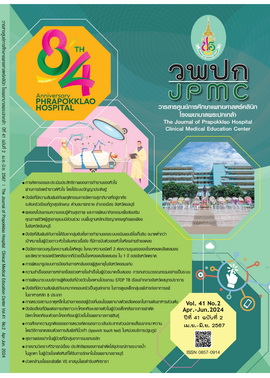Factors of Control Hypertension or Non-insulin-dependent Diabetes Mellitus Type 2 on The Severity of Stroke and Survival Rates Within 1 year in Trat Province
Main Article Content
Abstract
BACKGROUND: The situation of non-communicable disease groups is a leading health problem in the world. For the situation in Thailand, an increase in the number of new diagnoses and death cases among stroke patients was found from 2017-2022. For the situation in Trat Province, it was found that the sickness rates tended to be stable. As for the death rate per 100,000 people from stroke, there was a continuous upward trend. Therefore, a research project was organized to study the factors for control of diseases (hypertension or non-insulin-dependent diabetes mellitus type 2) concerning the severity of strokes and survival rates during 1 year, which could be used as information for future patient care.
OBJECTIVES: To study the factors that influence the severity of strokes and correlate them with survival rates within 1 year in Trat Province.
METHODS: This was a retrospective analytic cohort study. Data were collected using a Case Record Form (CRF) to record information from a total of 291 cases involving hypertension and non-insulin-dependent diabetes mellitus type 2 patients who entered the stroke treatment system at Trat Hospital during the year 2022. Data were analyzed by Chi-square statistics to test the relationship of NCD control with the severity of strokes. The Kaplan-Meier Curve was used to test the hypotheses for comparing survival rates using Log-rank test statistics.
RESULTS: It was found that the patients had good control of hypertension, which resulted in reduced severity of strokes. However, there was little to no effect on the patient's survival rate in one year. Controlling type 2 diabetes and hypertension in type 2 diabetes patients did not affect the severity of strokes or the survival rates of patients over a period of 1 year.
CONCLUSIONS: The patients with hypertension control will find the first-time severity of the stroke to be lower than the uncontrolled groups.
ClinicalTrials.gov Identifier, NCT06288269
Article Details

This work is licensed under a Creative Commons Attribution-NonCommercial-NoDerivatives 4.0 International License.
References
Ministry of Public Health. Report on the situation of NCDs, diabetes, high blood pressure and related risk factors 2019. Nonthaburi: Ministry of Public Health; 2020.
World Stroke Organization. WSO global stroke fact sheet 2022 [Internet]. 2022. [cited 2023 Sep 10]. Available from: https://www.world-stroke.org/news-and-blog/news/wso-global-stroke-fact-sheet-2022
Health Data Center. Rate of new patients from stroke [Internet]. 2023 [cited 2023 Sep 10] Available from: https://hdcservice.moph.go.th/hdc/reports/report.php?cat_id=39fd60c25235db479930db85a0e97dd3&id=b184366d9fa112292f8374184b21e1a8
Kogan E, Twyman K, Heap J, Milentijevic D, Lin JH, Alberts M. Assessing stroke severity using electronic health record data: a machine learning approach. BMC Med Inform DecisMak [Internet]. 2020. [cited 2023 Sep 10];20(1):8. Available from: https://www.ncbi.nlm.nih.gov/pmc/articles/PMC6950922/pdf/12911_2019_Article_1010.pdf
Tziomalos K, Spanou M, Bouziana SD, Papadopoulou M, Giampatzis V, Kostaki S, et al. Type 2 diabetes is associated with a worse functional outcome of ischemic stroke. World J Diabetes 2014;5:939-44.
Alawneh KZ, Qawasmeh MA, Raffee LA, Al-Mistarehi AH. Ischemic stroke demographics, clinical features and scales and their correlations: an exploratory study from Jordan. Future Sci OA [Internet]. 2022 [cited 2023 Sep 10];8(7):FSO809. Available from: https://www.ncbi.nlm.nih.gov/pmc/articles/PMC9540235/pdf/fsoa-08-809.pdf
Zhang X, Liu Y, Zhang F, Li J, Tong N. Legacy effect of intensive blood glucose control on cardiovascular outcomes in patients with type 2 diabetes and very high risk or secondary prevention of cardiovascular disease: a meta-analysis of randomized controlled trials. Clin Ther. 2018 May;40(5):776-88.e3.
Vemmos KN, Tsivgoulis G, Spengos K, Zakopoulos N, Synetos A, Manios E, et al. U-shaped relationship between mortality and admission blood pressure in patients with acute stroke. J Intern Med 2004;255:257-65.
Ntaios G, Egli M, Faouzi M, Michel P. J-shaped association between serum glucose and functional outcome in acute ischemic stroke. Stroke 2010;41:2366-70.
Hu G, Sarti C, Jousilahti P, Peltonen M, Qiao Q, Antikainen R, et al. The impact of history of hypertension and type 2 diabetes at baseline on the incidence of stroke and stroke mortality. Stroke 2005;36:2538-43.
Chang WW, Fei SZ, Pan N, Yao YS, Jin YL. Incident stroke and its influencing factors in patients with type 2 diabetes mellitus and/or hypertension: a prospective cohort study. Front Cardiovasc Med [Internet]. 2022[cited 2023 Sep 10]9:770025. Available from: https://www.ncbi.nlm.nih.gov/pmc/articles/PMC8863944/pdf/fcvm-09-770025.pdf
American Diabetes Association. Standards of medical care in diabetes-2022 abridged for primary care providers. Clin Diabetes 2022;40:10-38.
Kandil H, Soliman A, Alghamdi NS, Jennings JR, El-Baz A. Using mean arterial pressure in hypertension diagnosis versus using either systolic or diastolic blood pressure measurements. Biomedicines [Internet]. 2023 [cited 2023 Sep 10];11(3):849. Available from: https://www.ncbi.nlm.nih.gov/pmc/articles/PMC10046034/pdf/biomedicines-11-00849.pdf
Murphy SJ, Werring DJ. Stroke: causes and clinical features. Medicine (Abingdon) 2020;48:561-6.

